The era of new discoveries may be a history now, but 2010 brought good news for the explorers. A large of species are discovered during the year across the globe. This is a sign that nature is carefully hiding secretes from us and we need to put more efforts to find them all.
The discoveries of 2010 are mostly concentrated to some specific geographical zones or special biological missions. Amazon rain forests, the greater Mekong region, Ecuador, Deep sea/ocean are some of the regions from where large number of species are discovered. Missions like ’search for lost frogs’ has also helped finding number of new amphibians.
We have highlighted few of the amazing species discovered during the year 2010.
The Giant spider in Middle Eastern sand Dunes:
In early 2010, scientists discovered a giant species of spider hiding in sand dunes on the Israel-Jordan border. With a leg span that stretches 5.5 inches, the spider, named as Cerbalus aravensis, is the biggest of its type in the Middle East. The new discoveries in this region in the earth is very rare. it is really stunning that a spider of this giant size was not known to scientists till now!
The slug-sucking snake and the Scaly-eyed gecko of Ecuador:
On January 14th, 2010, a team of U.S. and Ecuadorian researchers, the nonprofit, Arizona based Reptile & Amphibian Ecology International announced a lists of 30 unknown species found in Ecuador’s highland forests. Among the discoveries two interesting species are the slug-sucking snake and a scaly-eyed Gecko. In just 20 minutes of nighttime searching in a rare patch of coastal dry forest in Ecuador, scientists spot the new species of snake. The slug-sucking snake is one of a small group that feasts on gastropods such as slugs and snails. Not only is the snake an unknown species, but its closest relative lives almost 560 kilometers away in Peru.
The scaly-eyed gecko , given a scientific name as Lepidoblepharis buchwaldi , can perch comfortably atop a pencil eraser, even as an adult. They crawl around in leaf litter on the forest floor, and they are so small they are very hard to find.
The carnivorous pitcher plant of Cambodia:
The Cardamom Mountains rain forests are one of the largest, isolated and still mostly unexplored forests in southeast Asia. This mountain range has been carefully keeping species and lives unknown to outside world due to lack of proper research. But there are recent efforts in this direction by researchers and sceintists to discover this hidden treasure of nature. One such successful mission is reported yesterday by Fauna and Flora International (FFI). The organization has discovered a new unique species which is a carnivorous pitcher plant. It is named as “Nepenthes holdenii“.
The bald parrot of Amazon:
More than thousand species have been discovered in the amazon rain forest in last ten years. The most recent of them is the bald parrot, reported by WWF in 2010. The bald parrot, named as Pyrilia aurantiocephala, a member of the true parrot family, has an extraordinary bald head. It displays an astonishing spectrum of colours. Known only from a few localities in the Lower Madeira and Upper Tapajos rivers in Brazil, the species has been listed as ‘near threatened’, due to its moderately small population, which is declining owing to habitat loss.
The mongoose like mammal carnivore of Madagaskar:
Madagascar, which is home to many unique species, has claimed a species on Oct, 2010 that is unknown to the rest of the world till date. The species is a small mammal carnivore having similarities to Mongoose found in one of the world’s most endangered lakes, Lac Alaotra. It is the first new species of meat-eating mammal discovered in 24 years. The species was named as Durrell’s vontsira (Salanoia durrelli), in the honor of the late conservationist and writer Gerald.
The tiny frog of Malaysia:
In the month of August, 2010, in the jungles of Borneo, Dr Indraneil Das and colleague Alexander Haas discovered a new tiny species. It is a frog measuring only 3 mm in length. The full grown adults of the species are of the size 9mm to 12mm. This species named as “Microhyla nepenthicola” was found in Kubah National Park, Malaysia. This is one of the smallest known frog species in the world.
The squidworm of deep sea:
A discovery made late 2010 from the deep sea near Philippine islands created excitement among the biologists. This species is neither a squid nor a worm, named a squidworm, could represent a missing link, or transitional species.



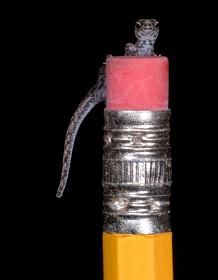
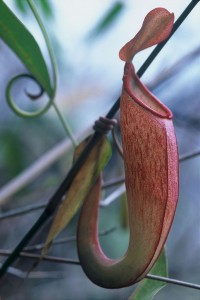
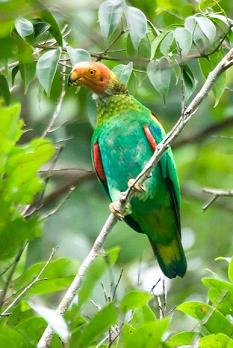
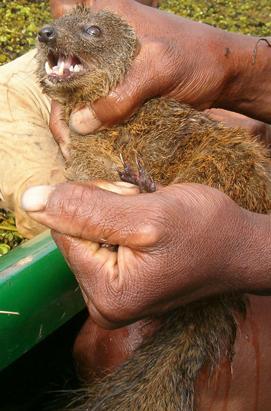
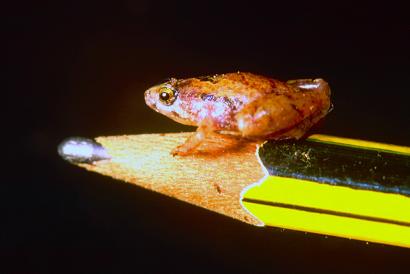
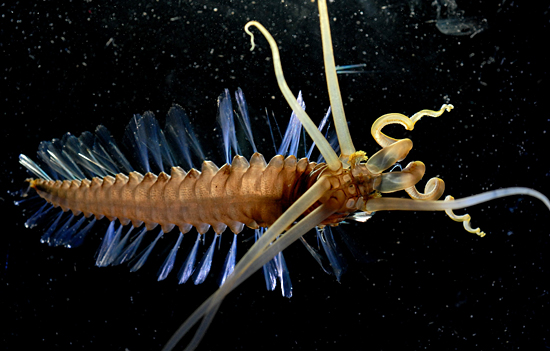
Recent Comments